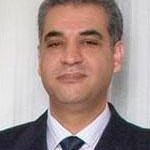It’s Day 4 of 7. I’m thinking of this man, previously unknown to me, who is among the seven innocent Baha’is now entering their eighth year of imprisonment in two Iranian jails. He — and his six partners in the most benevolent, world-minded sort of “crime” you could imagine — are the focus for the international #7Bahais7Years campaign, and this is my attempt to honour Mr. Naeimi. This probably isn’t what Danny and Pej had in mind; the bulk of the campaign they asked me to contribute to involves social media, an area where I have only narrow and entry-level eptitude. These friends, among others that I’m close to, have only 1 or 2 degrees of separation from these sacrificial lions. The Seven are enemies of an insecure state simply because of their membership in an often-ostracized community, which has been subject to nearly two centuries of bigoted slander from the entrenched shiah orthodoxy in what was once Persia, now Iran. I learn more of this tragic, heroic and underreported story of the Quietly Magnificent Seven, prisoners of conscience in Iran for a week of years. I call to remembrance people that I don’t know, because when I read their stories, they are no longer strangers.
When I was young, I thought I wanted to be a doctor. So did Afif Naeimi. I was undone, for most medical schools, by my underwhelming performance in university chem and biology labs. At the progressive school I came the closest to being selected for, my clumsy interview performance likely roasted my goose. Mr. Naeimi? Now that’s a different story. He’s 53 now, which means that when he graduated from high school, a superb student, the Islamic Republic of Iran was in place, and a member of the “detestable Baha’i sect” was automatically disqualified from university. This is still the case in 2015.
One of the good Doctor’s opening salvos was this. Imagine if what others knew about Christianity began and ended with Hitler. He was nominally a Christian. His troops stormed into the Sudetenland with the words “God is with us” engraved on their belts…For this, Dr. Lawson argued, is precisely the skewed perspective of Islam that too many of us have swallowed with our supper-hour newscasts. Bombings = Islam. Islam = opposition to progress. Islam = two thirds of the Axis of Evil. (Oh, the curse of speechmaking!)
Lawson is a professor of Islamic Studies at the University of Toronto, and our little family had run away on this weekend of thought and refreshment largely to hear him speak. He wanted us to think about revolution, one of the main casualties of which, no matter how praiseworthy are its aims and programs, is history. And among the histories we may think we know (but emphatically don’t) is that of Islam.
Dr. Lawson argues, for example, that “Europe was precisely defined (geographically and otherwise) by its defensive and offensive resistance to Islam”. In large measure, this is why Europe was so dark in the Dark Ages, whereas northern Africa and western Asia shone with Muslim civilization. Islam predominated in Spain, for example, for 800 years, more than three times the duration of the United States of America. In addition to co-existing amicably with Jewish and Christian communities, Islamic cities like Cordoba (and, not incidentally, Baghdad) were centres of arts and architecture, medicine, science and commerce.
The European Renaissance can be traced to its eventual increased openness to the scholarly, artistic and other resources of the Islamic culture that surrounded it. Avicenna – the Latinized name of the Persian Ibn-Sina, a gifted astronomer, physician, poet, mathematician and philosopher – was an 11th-century Muslim that Lawson terms “one of the four or five greatest geniuses of world civilization”. We know Leonardo, but we are ignorant of those that preceded and made him possible.
Our tour guide of Islamic culture and contribution debunked the standard criticisms of Muslims: their treatment of women and of apostates, their so-called “conversion by the sword”, their relative cultural decline in recent centuries, the much-muttered but sorely misunderstood concept of jihád. Lawson also emphasized the deep-rooted garrison mentality of the European heritage, in which a more powerful and more advanced Islamic civilization was feared and demonized as the “barbarians at the gates”. Those bogeyman whispers can still be heard in our contemporary public discourse.
Lawson, while not himself a Muslim, argued passionately in defence of Islam. One of the silver linings of the West’s forced encounter with Islam is that understanding is slowly growing. Muslim and other educated voices are raising the image of the Faith of Muhammad around the world. Dr. Lawson pointed out a remarkable irony: members of the Bahá’í community, branded as heretics and victims of persecution in some Muslim countries, are called upon to understand and defend all that is noble and good in Islam.
There was much more, brilliant and fascinating. (And oddly reassuring. This stuff CAN be understood. Okay!) I’ll offer more snippets another day.

